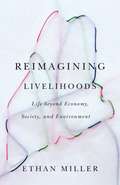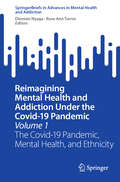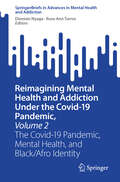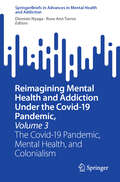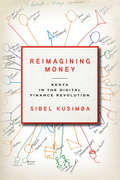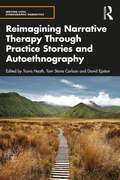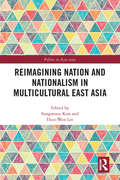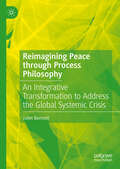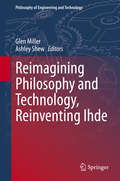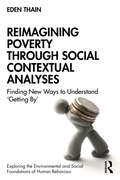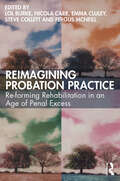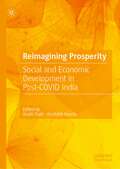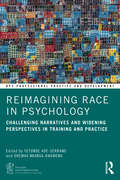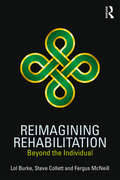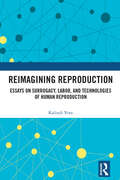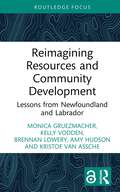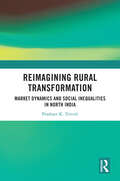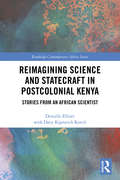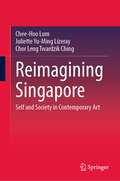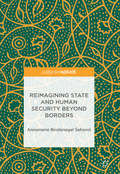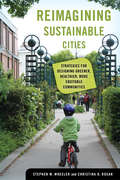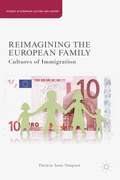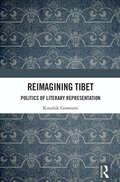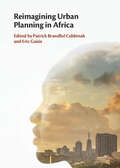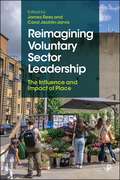- Table View
- List View
Reimagining Livelihoods: Life beyond Economy, Society, and Environment (Diverse Economies and Livable Worlds)
by Ethan MillerA provocative reassessment of the concepts underlying the struggle for sustainable developmentMuch of the debate over sustainable development revolves around how to balance the competing demands of economic development, social well-being, and environmental protection. &“Jobs vs. environment&” is only one of the many forms that such struggles take. But what if the very terms of this debate are part of the problem? Reimagining Livelihoods argues that the &“hegemonic trio&” of economy, society, and environment not only fails to describe the actual world around us but poses a tremendous obstacle to enacting a truly sustainable future.In a rich blend of ethnography and theory, Reimagining Livelihoods engages with questions of development in the state of Maine to trace the dangerous effects of contemporary stories that simplify and domesticate conflict. As in so many other places around the world, the trio of economy, society, and environment in Maine produces a particular space of &“common sense&” within which struggles over life and livelihood unfold. Yet the terms of engagement embodied by this trio are neither innocent nor inevitable. It is a contingent, historically produced configuration, born from the throes of capitalist industrialism and colonialism. Drawing in part on his own participation in the struggle over the Plum Creek Corporation&’s &“concept plan&” for a major resort development on the shores of Moosehead Lake in northern Maine, Ethan Miller articulates a rich framework for engaging with the ethical and political challenges of building ecological livelihoods among diverse human and nonhuman communities. In seeking a pathway for transformative thought that is both critical and affirmative, Reimagining Livelihoods provides new frames of reference for living together on an increasingly volatile Earth.
Reimagining Mental Health and Addiction Under the Covid-19 Pandemic, Volume 1: The Covid-19 Pandemic, Mental Health, and Ethnicity (Advances in Mental Health and Addiction)
by Dionisio Nyaga Rose Ann TorresThis edited collection is a follow-up to Algoma University's inaugural conference on mental health and addiction held at the Brampton campus in Ontario, Canada. We live in a society where many marginalized communities continue to bear a historically disproportionate burden on their psychological, mental, and economic well-being, especially under the Covid-19 pandemic. Covid-19 has had a continuing impact on marginalized and racialized communities at all levels. We are now witnessing the compounded effects in the form of a worsening mental health and addiction crisis and its subsequent impact on children's education, service delivery, and overall psychosocial well-being.Covid-19 has widened the gap and increased poverty disparities between high-income and low-income individuals. Furthermore, it has affected the psychosocial resilience of people. As communities of scholars, practitioners, and researchers, we have a responsibility to address these existential issues in ways that are ethical and transformative. This type of engagement should help mitigate the consequences of the pandemic in an intersectional manner. These conversations should assist us in understanding and addressing the trauma and suffering that marginalized communities and individuals continue to endure. Together, we can work to find answers to mental health and addiction challenges, while valuing people's histories and realities within this intersectional engagement.This book aims to redefine psychiatric discourse in the age of the pandemic and encourage us to imagine how the world can be reformed in ways that are both ethical and political. It has the potential to shed light on the values and realities of communities in discussions of medical sociology, particularly concerning the impact of Covid-19 on marginalized communities.This book is structured into three volumes. Volume one delves into the repercussions of the COVID-19 pandemic on the mental health of various ethnic groups. Volume two specifically addresses the impact of the pandemic on the mental health of Afro-Black individuals. Volume three explores the connections between the COVID-19 pandemic, psychological well-being, and colonialism.
Reimagining Mental Health and Addiction Under the Covid-19 Pandemic, Volume 2: The Covid-19 Pandemic, Mental Health, and Black/Afro Identity (Advances in Mental Health and Addiction)
by Dionisio Nyaga Rose Ann TorresThis edited collection is a follow-up to Algoma University's inaugural conference on mental health and addiction held at the Brampton campus in Ontario, Canada. We live in a society where many marginalized communities continue to bear a historically disproportionate burden on their psychological, mental, and economic well-being, especially under the Covid-19 pandemic. Covid-19 has had a continuing impact on marginalized and racialized communities at all levels. We are now witnessing the compounded effects in the form of a worsening mental health and addiction crisis and its subsequent impact on children's education, service delivery, and overall psychosocial well-being. Covid-19 has widened the gap and increased poverty disparities between high-income and low-income individuals. Furthermore, it has affected the psychosocial resilience of people. As communities of scholars, practitioners, and researchers, we have a responsibility to address these existential issues in ways that are ethical and transformative. This type of engagement should help mitigate the consequences of the pandemic in an intersectional manner. These conversations should assist us in understanding and addressing the trauma and suffering that marginalized communities and individuals continue to endure. Together, we can work to find answers to mental health and addiction challenges, while valuing people's histories and realities within this intersectional engagement. This book aims to redefine psychiatric discourse in the age of the pandemic and encourage us to imagine how the world can be reformed in ways that are both ethical and political. It has the potential to shed light on the values and realities of communities in discussions of medical sociology, particularly concerning the impact of Covid-19 on marginalized communities. This book is structured into three volumes. Volume one delves into the repercussions of the COVID-19 pandemic on the mental health of various ethnic groups. Volume two specifically addresses the impact of the pandemic on the mental health of Afro-Black individuals. Volume three explores the connections between the COVID-19 pandemic, psychological well-being, and colonialism.
Reimagining Mental Health and Addiction Under the Covid-19 Pandemic, Volume 3: The Covid-19 Pandemic, Mental Health, and Colonialism (Advances in Mental Health and Addiction)
by Dionisio Nyaga Rose Ann TorresThis edited collection is a follow-up to Algoma University's inaugural conference on mental health and addiction held at the Brampton campus in Ontario, Canada. We live in a society where many marginalized communities continue to bear a historically disproportionate burden on their psychological, mental, and economic well-being, especially under the Covid-19 pandemic. Covid-19 has had a continuing impact on marginalized and racialized communities at all levels. We are now witnessing the compounded effects in the form of a worsening mental health and addiction crisis and its subsequent impact on children's education, service delivery, and overall psychosocial well-being.Covid-19 has widened the gap and increased poverty disparities between high-income and low-income individuals. Furthermore, it has affected the psychosocial resilience of people. As communities of scholars, practitioners, and researchers, we have a responsibility to address these existential issues in ways that are ethical and transformative. This type of engagement should help mitigate the consequences of the pandemic in an intersectional manner. These conversations should assist us in understanding and addressing the trauma and suffering that marginalized communities and individuals continue to endure. Together, we can work to find answers to mental health and addiction challenges, while valuing people's histories and realities within this intersectional engagement.This book aims to redefine psychiatric discourse in the age of the pandemic and encourage us to imagine how the world can be reformed in ways that are both ethical and political. It has the potential to shed light on the values and realities of communities in discussions of medical sociology, particularly concerning the impact of Covid-19 on marginalized communities.This book is structured into three volumes. Volume one delves into the repercussions of the COVID-19 pandemic on the mental health of various ethnic groups. Volume two specifically addresses the impact of the pandemic on the mental health of Afro-Black individuals. Volume three explores the connections between the COVID-19 pandemic, psychological well-being, and colonialism.
Reimagining Money: Kenya in the Digital Finance Revolution (Culture and Economic Life)
by Sibel KusimbaTechnology is rapidly changing the way we think about money. Digital payment has been slow to take off in the United States but is displacing cash in countries as diverse as China, Kenya, and Sweden. In Reimagining Money, Sibel Kusimba describes the rise of M-Pesa, and offers a rich portrait of how this technology changes the economic and social landscape, allowing users to create webs of relationships as they exchange, pool, borrow, lend, and share digital money in user-built networks. These networks, Kusimba argues, will shape the future of financial technologies and their impact on poverty, inclusion, and empowerment. She describes how urban and transnational migrants maintain a presence in rural areas through money gifts; how families use crowdfunding software to assemble donations for emergency medical care; and how new financial groups invest in real estate and fund weddings. The author presents fascinating accounts that challenge accepted wisdom by examining the notion of money as wealth-in-people—an idea long-cultivated in sub-Saharan Africa and now brought to bear on the digital age with homegrown financial technologies such as digital money transfer, digital microloans, and crowdfunding. The book concludes by proposing a new theory of money that can be applied to designing better financial technologies in the future.
Reimagining Narrative Therapy Through Practice Stories and Autoethnography (Writing Lives: Ethnographic and Autoethnographic Narratives)
by Travis HeathReimagining Narrative Therapy Through Practice Stories and Autoethnography takes a new pedagogical approach to teaching and learning in contemporary narrative therapy, based in autoethnography and storytelling. The individual client stories aim to paint each therapeutic meeting in such detail that the reader will come to feel as though they actually know the two or more people in the room. This approach moves beyond the standard narrative practice of teaching by transcripts and steps into teaching narrative therapy through autoethnography. The intention of these 'teaching tales' is to offer the reader an opportunity to enter into the very 'heart and soul' of narrative therapy practice, much like reading a novel has you enter into the lives of the characters that inhabit it. This work has been used by the authors in MA and PhD level classrooms, workshops, week-long intensive courses, and conferences around the world, where it has received commendations from both newcomer and veteran narrative therapists. The aim of this book is to introduce narrative therapy and the value of integrating autoethnographic methods to students and new clinicians. It can also serve as a useful tool for advanced teachers of narrative practices. In addition, it will appeal to established clinicians who are curious about narrative therapy (who may be looking to add it to their practice), as well as students and scholars of autoethnography and qualitative inquiry and methods.
Reimagining Nation and Nationalism in Multicultural East Asia (Politics in Asia)
by Sungmoon Kim Hsin-Wen LeeSince the late 1980s, many East Asian countries have become more multicultural, a process marked by increased democracy and pluralism despite the continuing influence of nationalism, which has forced these countries in the region to re-envision their nations. Many such countries have had to reconsider their constitutional make-up, their terms of citizenship and the ideal of social harmony. This has resulted in new immigration and border-control policies and the revisiting of laws regarding labor policies, sociopolitical discrimination, and socioeconomic welfare. This book explores new perspectives, concepts, and theories that are socially relevant, culturally suitable, and normatively attractive in the East Asia context. It not only outlines the particular experiences of nation, citizenship, and nationalism in East Asian countries but also places them within the wider theoretical context. The contributors look at how nationalism under the force of multiculturalism, or vice versa, affects East Asian societies including China, Japan, Korea, Taiwan, and Hong Kong differently. The key themes are: Democracy and equality; Confucianism’s relationship with nationalism, cosmopolitanism and multiculturalism; China’s use of its political institutions to initiate and sustain nationalism; the impact of globalization on nationalism in South Korea, Taiwan and Japan; the role of democracy in reinvigorating indigenous cultures in Taiwan.
Reimagining Peace through Process Philosophy: An Integrative Transformation to Address the Global Systemic Crisis
by Juliet BennettThis book explores the ways in which process philosophers extend and strengthen peace scholars’ outlines of a paradigm of/for peace. It then illustrates the value of such a peace paradigm through the example of the climate breakdown, showing how process thinking and process metaphysics intervene at the roots of a global systemic crisis. In doing so, it articulates a new inroad to process philosophy, and illuminates an integrative intervention in the systemic crises of climate change and global inequality. The “static-process framework” developed in this book makes the philosophy of Alfred North Whitehead and the fields he has inspired easier to grasp, and offers a tool to assist in the application of process thought to a multitude of issues. This framework depicts tensions between two modes of thought—static and process thinking—according to five “basic orientations”: abstract/context, closed/open, isolating/relational; passive/generative; one/multi-dimensional. This pattern is mapped across the domains of metaphysics, economics, politics and as the basis for a new mode of living and organising across multiple layers of society.
Reimagining Philosophy and Technology, Reinventing Ihde (Philosophy of Engineering and Technology #33)
by Ashley Shew Glen MillerThis volume includes eleven original essays that explore and expand on the work of Don Ihde, bookended by two chapters by Ihde himself. Ihde, the recipient of the first Society for Philosophy and Technology's Lifetime Achievement Award in 2017, is best known for his development of postphenomenology, a blend of pragmatism and phenomenology that incorporates insights into the ways technology mediates human perception and action.The book contains contributions from academics from Europe, North America, and Asia, which demonstrates the global impact of Ihde’s work. Essays in the book explore the relationship between Ihde's work and its origins in phenomenology (especially Husserl and Heidegger) and American pragmatism; integrate his philosophical work within the embodied experience of radical architecture and imagine the possibility of a future philosophy of technology after postphenomenology;develop central ideas of postphenomenology and expand the resources present in postphenomenology to ethics and politics; andextend the influence of Ihde's ideas to mobile media and engineering, and comprehensively assess the influence of his work in China. The book includes a reprint of the Introduction of Sense and Significance, one of Ihde's first books; "Hawk: Predatory Vision," a new chapter that blends his biographical experience with feminism, technoscience, and environmental observation; and an appendix that lists all of Ihde's books as well as secondary sources annotated by Ihde himself. Starting with an Editors' Introduction that offers an overview of the central ideas in Ihde's corpus and concluding with an index that facilitates research across the various chapters, this book is of interest to a diverse academic community that includes philosophers, STM scholars, anthropologists, historians, and sociologists.
Reimagining Poverty through Social Contextual Analyses: Finding New Ways to Understand ‘Getting By’ (Exploring the Environmental and Social Foundations of Human Behaviour)
by Eden ThainThis book is the first of its kind to apply social contextual analysis to the issue of poverty. It sets out detailed accounts of poverty based on original research and shows how understanding life contexts can give us a deeper understanding of the issue.The book highlights detailed life contexts from a project exploring the everyday experience of poverty, including what poverty is and what psychology has to say about poverty. It showcases work from an original study in Australia that uses on-the-ground participatory interview research, integrating this with international literature to provide a comprehensive analysis of poverty. The chapters explore the complexity, and often the simplistic reductions used in answering questions that try to define poverty, the psychological understanding of the phenomena, how individuals experience it, and the general opinion of the status-quo regarding poverty. However, most importantly the book tries to investigate why we have not solved poverty in modern, capitalist life, and sets out recommendations for research, practice, and policy in addressing issues of poverty.Showing the need for rigorous and on-the-ground approaches to addressing poverty and its many complications, the book will be highly relevant to students and researchers in the fields of social psychology, critical psychology, community psychology, social work, and social policy. It will also be relevant for anyone interested in the application of social psychological research techniques to the understanding and intervention of social issues, by showing pathways to better explore and understand human behaviour.
Reimagining Probation Practice: Re-forming Rehabilitation in an Age of Penal Excess
by Nicola Carr Fergus McNeill Lol Burke Steve Collett Emma CluleyThis book provides a comprehensive and positive reimagining of probation practice in England and Wales across all the key settings in which work with people subject to supervision takes place. Bringing together chapters co-authored by academics and practitioners, it offers an overall conceptualisation of the rehabilitative endeavour within the realities of a probation service recently unified after the acknowledged failure of the Transforming Rehabilitation reforms. Reimagining Probation Practice covers the main themes and job functions of probation practice, from court work to individual and group interventions, to resettlement and public protection, to partnerships, to education and training. Each chapter includes a brief critical history of the area of practice, the current policy context, the applicability of different forms of rehabilitation (personal, legal/judicial, social and moral) to this area of practice, an overview of current good practice and areas in need of development. The book argues that the principles of parsimony, proportionality and productiveness should be applied to the criminal justice system in its work to rehabilitate individuals. This book is essential reading for practitioners and all those engaged in probation training, as well as policy makers, leaders, managers and those interested in social and criminal justice..
Reimagining Prosperity: Social and Economic Development in Post-COVID India
by Amitabh Kundu Arash FazliThis book explores the second-order effects of the COVID-19 pandemic on social and economic development in India. The chapters in this volume provide theoretical perspectives and empirical insights from a range of disciplines including history, economics, water management, food and nutrition security, agriculture, rural management, public health, urbanization, gender studies and development of the marginalized. It discusses the pressing questions that have been raised by the disruption caused by the pandemic and proposes insights and interventions to build a more just, sustainable and united post-COVID India.
Reimagining Race in Psychology: Challenging Narratives and Widening Perspectives in Training and Practice (BPS Professional Practice and Development Series)
by Yetunde Ade-Serrano Ohemaa Nkansa-DwamenaThis important book brings together race, mental health and applied psychology, unpacking these areas from differing perspectives and offering new insights in support of training and development of practice.The ability to work with issues of race and intersectionality within psychology is vital. Contributors with experience in counselling psychology and applied psychology from across varied social contexts and professional settings reframe and challenge familiar concepts such as movements to decolonise the curriculum, psychology and therapy. The chapters offer clinical vignettes, lived experiences and reflective questions to provoke the reader’s thinking and engage with curiosity and sensitivity around cultural bias, discrimination, language, and the evolution of terminologies. This book captures the relationship between the ethos of counselling psychology and race, offering a much-needed guide for how to encompass race and racialised experiences in the training and practice of psychology. Rooted in the United Kingdom context but applicable more widely, contributions cover training, supervision, ethical practice, racial trauma, bias and diagnosis, and politics, as well as perspectives and approaches in practice at the intersection of race and gender, age, neurodiversity, sexuality, and spirituality.This is a key resource for the continued development of in-training and experienced psychologists and psychotherapists, as well as other practitioners within the mental health and allied professions. It will also be of use to students in clinical training programmes and courses such as applied psychology, counselling, and psychotherapy.
Reimagining Rehabilitation: Beyond the Individual
by Fergus McNeill Lol Burke Steve CollettThis book aims to make the case for and provide some of the resources necessary to reimagine rehabilitation for twenty-first-century criminal justice. Outlining an approach to rehabilitation which takes into account wider democratic processes, political structures and mechanisms of resource allocation, the authors develop a new model of rehabilitation comprising four forms – personal, legal, social and moral. Personal rehabilitation concerns how individuals make their journeys away from offending and towards reintegration and how they can be supported to do so, whilst legal rehabilitation concerns the role of the criminal courts in the process of restricting and then restoring the rights and status of citizens. Moral rehabilitation is concerned with the ethical basis of the interactions between the individual who has offended and the people and organisations charged with providing rehabilitative services. Social rehabilitation explores the crucial contribution civil society can make to rehabilitation, exploring this through the lens of citizenship, community and social capital. Drawing on the conceptual insights offered in the late Stan Cohen’s seminal work – Visions of Social Control – and specifically his insistence that modern social institutions can aspire to doing good and doing justice, the authors argue that these values can underpin a moral pragmatism in designing social interventions that must go beyond achieving simply instrumental ends. Reimaging rehabilitation within the context of social action and social justice, this book is essential reading for students and scholars alike, particularly those engaged with criminal justice policy, probation and offender rehabilitation.
Reimagining Reproduction: Essays on Surrogacy, Labor, and Technologies of Human Reproduction
by Kalindi VoraThis book presents an ethnographic study on gestational surrogacy in India. It frames the ethnography of the surrogacy clinic in conversation with concerns raised in the arenas of law, policy, medical ethics, and global structural inequality about the ethics of transnational assisted reproductive technology (ART) practices. Engaging ethical discourses that both advocate for and trouble the subject of reproductive rights that remains of interest in feminist studies, the volume takes up the work of critical feminist, anthropological and science studies scholarship in India, the United States, and Europe concerned with reproductive technologies. Based on fieldwork and archival sources, the volume will be of great interest to scholars and researchers of ethnography, gender, social and public policy, South Asian studies, and global public health, especially reproductive health.
Reimagining Resources and Community Development: Lessons from Newfoundland and Labrador (Earthscan Studies in Natural Resource Management)
by Kelly Vodden Kristof Van Assche Monica Gruezmacher Brennan Lowery Amy HudsonThis book analyzes the experiences of communities facing major challenges relating to resource dependency and community sustainability, drawing on specific examples from the Canadian province of Newfoundland and Labrador. It offers a methodology of self-analysis for communities facing similar challenges, inspired by the ups and downs, local strategies for self-analysis, and collaborative work toward new futures in this Canadian province.Life in hundreds of small coastal settlements revolved around the cod fishery, until the fishery was no more viable. Communities have had to rethink their strengths, reconsider their assets, and imagine potential futures in the wake of events such as colonization and the collapse of the fishing industry. Their experiences are relevant for other parts of the world where formerly central resources are depleted or lose their value, and communities face the need for transition. The capacity to imagine different futures is rooted in the ability to critically consider strengths and weaknesses alike. The authors skillfully dissect and illuminate the conditions that can enable the reconsideration of local assets and narratives, toward a more sustainable future. The variety of these conditions, ranging from social memory to public debate, policy tools and institutional capacity, decision arenas, paths for participation, and distributed strategic leadership, are laid out clearly and illustrated vividly through vignettes written by individuals who participated in the events described. This book culminates in a flexible yet clearly structured method of self-analysis, useful for communities interested in rethinking their strengths and working toward new futures.This book will appeal to students, scholars, and professionals interested in community development and redevelopment and offers a new understanding of the mechanics of local and regional resilience
Reimagining Rural Transformation: Market Dynamics and Social Inequalities in North India
by Prashant K TrivediThis book examines the effects of the pattern of growing integration between the rural and urban economies in India. Drawing on in-depth surveys conducted in villages in north India, it examines the rural agricultural economy's transformation, productivity, technology deployment, and social relations over a period of seven years. The book focuses on the socially embedded nature of the dynamics of transformation, weaving analysis around the axis of land, caste, and gender. It also identifies policy gaps and recommends steps for a sustainable and inclusive rural transformation in the Global South.An important contribution to the study of India’s economic and social landscape, this book will be useful for scholars of agriculture, sociology, economics, political science, development studies, and South Asian studies. It will also be of interest to policymakers and journalists interested in rural development, migration, employment, agriculture, and demography.
Reimagining Science and Statecraft in Postcolonial Kenya: Stories from an African Scientist (Routledge Contemporary Africa)
by Denielle ElliottThis book examines the development of medical sciences in postcolonial Kenya, through the adventures and stories of the controversial Kalenjin scientist Davy Kiprotich Koech. As a collaborative life story project, it privileges African voices and retellings, re-centring the voice of African scientists from the peripheries of storytelling about science, global health research collaborations, national politics, international geopolitical alliances, and medical research. Focusing largely on the development of the Kenya Medical Research Institute (KEMRI) and its collaborations with the US Centers for Disease Control, the Walter Reed Project, Japan’s International Cooperation Agency, the Wellcome Trust, and other international partners, Denielle Elliott and Davy Koech challenge euro-dominant representations of African science and global health in both the contemporary and historical and offer an unconventional account which aims to destabilize colonial and neo-colonial narratives about African science, scientists, and statecraft. The stories force readers to contend with a series of questions including: How do imperial effects shape contemporary medical research and national sovereignty? In which ways do the colonial ghosts of early medical research infuse the struggles of postcolonial scientists to build national scientific projects? How were postcolonial nation-building projects tied up with the dreams and visions of African scientists? And lastly, how might we reimagine African medicine and biosciences? The monograph will be of interest to students, educators, and scholars working in African Studies, Science and Technology Studies, Postcolonial Studies, Global Health, Cultural Anthropology, and Medical Anthropology.
Reimagining Singapore: Self and Society in Contemporary Art
by Chee-Hoo Lum Juliette Yu-Ming Lizeray Chor Leng Twardzik ChingThis book approaches the subject of contemporary art by exploring the social embeddedness and identities of Singaporean artists. Linking artistic processes and production to both personal worlds and wider issues, the book examines how artists negotiate their relationships between self and society and between artistic freedom and social responsibility. It is based on original research into the discourses and artistic practices of local artists, with a special focus on emerging artists and artists whose work and perspectives engage with questions of identity. Reimagining contemporary Singapore and their place within it, artists are asserting their multiple and heterogeneous self-identities and contesting hegemonic norms and notions, as they negotiate and adapt to the world around them. This book is relevant to students and researchers in the fields of cultural studies, media studies, art, sociology of art, arts education, and race and ethnicity studies.
Reimagining State and Human Security Beyond Borders
by Annamarie Bindenagel ŠehovićThis book delves into the diffuse relationship between states, citizens, and non-citizens. It explores the theoretical heritage of human security and identifies practical responses to the (re)negotiated relationships between states and citizens, responsibility and accountability. It argues that the changes to global order since the 1990s have resulted in a divergence from the understanding of the State as the arbiter within its territory, and as the guarantor of (human) security within its borders. In addition, while interventionist actions of various non-state actors to implement material guarantees of (human) security reaching both citizens and non-citizens (including refugees) have solved some immediate problems, they have not answered the question of where accountability ultimately lies.
Reimagining Sustainable Cities: Strategies for Designing Greener, Healthier, More Equitable Communities
by Stephen M. WheelerA cutting-edge, solutions-oriented analysis of how we can reimagine cities around the world to build sustainable futures. What would it take to make urban places greener, more affordable, more equitable, and healthier for everyone? In recent years, cities have stepped up efforts to address climate and sustainability crises. But progress has not been fast enough or gone deep enough. If communities are to thrive in the future, we need to quickly imagine and implement an entirely new approach to urban development: one that is centered on equity and rethinks social, political, and economic systems as well as urban designs. With attention to this need for structural change, Reimagining Sustainable Cities advocates for a community-informed model of racially, economically, and socially just cities and regions. The book aims to rethink urban sustainability for a new era. In Reimagining Sustainable Cities, Stephen M. Wheeler and Christina D. Rosan ask big-picture questions of interest to readers worldwide: How do we get to carbon neutrality? How do we adapt to a climate-changed world? How can we create affordable, inclusive, and equitable cities? While many books dwell on the analysis of problems, Reimagining Sustainable Cities prioritizes solutions-oriented thinking—surveying historical trends, providing examples of constructive action worldwide, and outlining alternative problem-solving strategies. Wheeler and Rosan use a social ecology lens and draw perspectives from multiple disciplines. Positive, readable, and constructive in tone, Reimagining Sustainable Cities identifies actions ranging from urban design to institutional restructuring that can bring about fundamental change and prepare us for the challenges ahead.
Reimagining The European Family
by Patricia Anne SimpsonRe-imagining the Family explores contemporary films and literature about the effects of legal and illegal immigration on the structure and the stories of the contemporary 'European' family, with a focus on Germany.
Reimagining Tibet: Politics of Literary Representation
by Koushik GoswamiThis book examines how territorial, civilisational and cultural location determines one’s gaze and attitude while representing a contested space like Tibet. It analyses representations of Tibet in three novels: James Hilton’s Lost Horizon (1933), Jamyang Norbu’s The Mandala of Sherlock Holmes (1999) and Kaushik Barua’s Windhorse (2013). It shows how these novels project different types of gaze — insider, outsider and insider-outsider — and explores them within the context of some contemporary Tibetan activist writers. The book also looks at Tibetan exilic writings and virtual activities of the Tibetan activists whose programmes and rhetoric counter the age-old image of the Tibetans as passive and non-violent people. It shows how activists utilise social networking as an effective platform to counter imperialist occupation of Tibet by China. It includes interviews of eight Anglophone Tibetan writers – Tenzin Tsundue, Thubten Samphel, Tsering Namgyal Khortsa, Tsering Wangmo Dhompa, Jamyang Norbu, Tenzin Dickie, Bhuchung D. Sonam, and an Indian writer who has written on Tibet, Kaushik Barua. Interdisciplinary, accessible and engaging, this book presents one of the first studies on how Tibet has been represented in English fiction. It will be of interest to scholars and researchers of literature, media and cultural studies, politics, history and China studies.
Reimagining Voluntary Sector Leadership: The Influence and Impact of Place
by James Rees and Carol Jacklin-JarvisThe voluntary sector plays a crucial role in shaping place, and is in turn shaped by that context, yet this ‘place leadership’ role has been underexplored in research. This interdisciplinary book brings together leading scholars and practitioners to examine this intriguing phenomenon in different political and cultural contexts. Using case studies from the UK, the US, China and Europe, the book provides fresh insights into the dynamic relationship between place, leadership and voluntary action. Written in an accessible, jargon-free style, it sets state-of-the-art agendas for understanding and strengthening the voluntary sector’s influence in place leadership.
